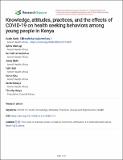| dc.contributor.author | Karijo, Evalin | |
| dc.contributor.author | Wamugi, Sylvia | |
| dc.contributor.author | Lemanyishoe, Samuel | |
| dc.contributor.author | Njuki, Jenny | |
| dc.contributor.author | Boit, Faith | |
| dc.contributor.author | Kibui, Vania | |
| dc.contributor.author | Karanja, Sarah | |
| dc.contributor.author | Abuya, Timothy | |
| dc.date.accessioned | 2022-01-26T20:35:49Z | |
| dc.date.available | 2022-01-26T20:35:49Z | |
| dc.date.issued | 2020-06-17 | |
| dc.identifier.citation | Karijo, Evalin & Wamugi, Sylvia & Lemanyishoe, Samuel & Njuki, Jenny & Boit, Faith & Kibui, Vania & Karanja, Sarah & Abuya, Timothy. (2020). Knowledge, attitudes, practices, and the effects of COVID-19 on health seeking behaviors among young people in Kenya. 10.21203/rs.3.rs-34861/v1. | en_US |
| dc.identifier.other | DOI: https://doi.org/10.21203/rs.3.rs-34861/v1 | |
| dc.identifier.uri | https://repository.amref.ac.ke/handle/123456789/535 | |
| dc.description | This work is licensed under a Creative Commons Attribution 4.0 International License.
Read Full License | en_US |
| dc.description.abstract | Background: The cases of Corona Virus Disease of 2019 (COVID-19) in Kenya have been increasing
rapidly, since the rst case was conrmed in early March, 2020. In the wake of the crisis around COVID-
19, the health and socio-economic challenges experienced by Kenya’s largest demography, the youth, are
likely to elevated. This study sought to establish knowledge levels, gaps and attitude of the youth with
regards to COVID-19 and identify the effects of the pandemic on health seeking behaviour and socioeconomic
status of youth.
Methods: A cross sectional descriptive study was conducted among 2,153 youth across 47 counties in
Kenya, through a combined online survey and phone interviews. All survey responses analyzed using
STATA v15 were tabulated by gender, age, education level to generate basic descriptive tables and tested
for differences by category using chi-square tests with a signicance level of 0.05. Where applicable
linear and logistic regression analysis model was conducted with covariates such as employment status,
gender and education level were used.
Results: Knowledge on symptoms of COVID-19 was generally high. Female respondents were more likely
to name more symptoms correctly compared to men; p<0.001. However, youth reported very low levels of
anyone being at risk of infection (7%). Since they started receiving messaging on COVID-19, most youth
have adopted behavior necessary to slow down the infection. There were generally very low reported
levels of inability to access health services related to sexual and reproductive health. About 50% of
respondents reported signicant decline in income during the pandemic period, while nearly a third
reported living in fear while 27% reported feeling stressed.
Conclusion: Our study revealed considerably high knowledge of COVID-19 symptoms, preventive
strategies and most commonly sources of information that are instructive for the pandemic response.
Findings suggest messaging campaigns should focus on reaching clarifying risk groups. The need to
track health service use among youth is essential to lay longer term strategies towards minimizing
potential long-term consequences of the pandemic. Strategies to sustain behaviors positively adopted
and leverage the vast network of youth as champions of behavior change will be critical to reduce the
spread of COVID-19. | en_US |
| dc.language.iso | en | en_US |
| dc.publisher | Research Square | en_US |
| dc.subject | Corona Virus Disease | en_US |
| dc.subject | Socio-economic challenges | en_US |
| dc.subject | Pandemic | en_US |
| dc.subject | Knowledge | en_US |
| dc.subject | Sexual and reproductive health (SRH) | en_US |
| dc.subject | Preventive strategies | en_US |
| dc.subject | Behaviors | en_US |
| dc.subject | Coronaviruses | en_US |
| dc.subject | Respiratory viruses | en_US |
| dc.subject | Middle-East Respiratory Syndrome (MERS) | en_US |
| dc.subject | Severe Acute Respiratory Syndrome (SARS) | en_US |
| dc.title | Knowledge, Attitudes, Practices, and the Effects of COVID-19 on Health Seeking Behaviors Among Young People in Kenya | en_US |
| dc.type | Video | en_US |

